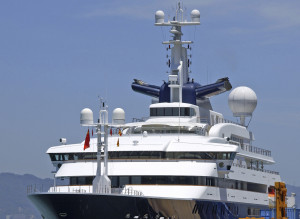Congress recently altered the country's farm bill, cutting billions from the food stamp program over the next decade.
That comes after more than a decade of the same bill providing millions in farm subsidies to billionaires' businesses, according to a report released Thursday by the Environmental Working Group, a left-leaning think tank. Those billionaire subsidies would only increase in the coming years, the report found.
In total, U.S. taxpayers provided $11.3 million in subsidies to businesses with ties to the 50 billionaires between 1995 and 2012. The subsidies were first instituted to help family farms keep afloat when prices of certain crops got too low, but now smaller farms have largely been crowded out by larger farming corporations that control many levels of production.
Thanks to subsidies for crops like corn, barley and sorghum, the billionaires -- who have a combined net worth of $316 billion, according to the Forbes data provided in the report -- are able to get taxpayer money for their farming businesses. Among them is Paul Allen, the co-founder of Microsoft, whose Kona Residence Trust received $14,429 in barley subsidies between 1995 and 2002, according to the report.
Congress is currently weighing changes to the farm bill. But in both versions being considered by the House and Senate, billionaire subsidies would likely only increase, despite the recent decision to cut deep into the country's food stamp program. (Forty-seven million Americans are already reeling from cuts to the food stamp program that took effect last week.)
"The irony here is rich," Craig Cox, a senior vice president at EWG, told The Huffington Post. "We're sending billionaires farm subsidies while at the same we’re proposing to make it harder for poor families to buy food."
The report likely even underestimates the amount of taxpayer help billionaires indirectly receive through the farm bill. That’s because they're also likely benefitting from indirect subsidies through another program, the crop insurance program, the recipients of which remain unidentified by law.
Unlike the direct subsidies, which have a cap of $40,000 per farm, companies are allowed to receive unlimited crop insurance subsidies. The program was developed during the Depression to boost struggling farmers, but now is largely used by wealthy farmers to subsidize growing risky crops, according to a Bloomberg report.
Original Article
Source: huffingtonpost.com
Author: The Huffington Post
That comes after more than a decade of the same bill providing millions in farm subsidies to billionaires' businesses, according to a report released Thursday by the Environmental Working Group, a left-leaning think tank. Those billionaire subsidies would only increase in the coming years, the report found.
In total, U.S. taxpayers provided $11.3 million in subsidies to businesses with ties to the 50 billionaires between 1995 and 2012. The subsidies were first instituted to help family farms keep afloat when prices of certain crops got too low, but now smaller farms have largely been crowded out by larger farming corporations that control many levels of production.
Thanks to subsidies for crops like corn, barley and sorghum, the billionaires -- who have a combined net worth of $316 billion, according to the Forbes data provided in the report -- are able to get taxpayer money for their farming businesses. Among them is Paul Allen, the co-founder of Microsoft, whose Kona Residence Trust received $14,429 in barley subsidies between 1995 and 2002, according to the report.
Congress is currently weighing changes to the farm bill. But in both versions being considered by the House and Senate, billionaire subsidies would likely only increase, despite the recent decision to cut deep into the country's food stamp program. (Forty-seven million Americans are already reeling from cuts to the food stamp program that took effect last week.)
"The irony here is rich," Craig Cox, a senior vice president at EWG, told The Huffington Post. "We're sending billionaires farm subsidies while at the same we’re proposing to make it harder for poor families to buy food."
The report likely even underestimates the amount of taxpayer help billionaires indirectly receive through the farm bill. That’s because they're also likely benefitting from indirect subsidies through another program, the crop insurance program, the recipients of which remain unidentified by law.
Unlike the direct subsidies, which have a cap of $40,000 per farm, companies are allowed to receive unlimited crop insurance subsidies. The program was developed during the Depression to boost struggling farmers, but now is largely used by wealthy farmers to subsidize growing risky crops, according to a Bloomberg report.
Original Article
Source: huffingtonpost.com
Author: The Huffington Post

No comments:
Post a Comment